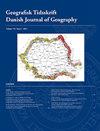发展中国家市政服务可接受性与城市化之间的差异:来自加纳阿克拉和塞孔迪-塔科拉迪的见解
IF 1.1
4区 社会学
Q4 ENVIRONMENTAL STUDIES
Geografisk Tidsskrift-Danish Journal of Geography
Pub Date : 2017-05-29
DOI:10.1080/00167223.2017.1331745
引用次数: 5
摘要
在大多数发展中国家,市政服务和基础设施的提供总是无法与城市化的步伐和需求相匹配。其结果往往是由于规划不当、官方官僚障碍以及公共资源不足和减少而导致非正式性增加,这使得利用私人资本提供公共服务变得势在必行。通过对加纳两个城市进行深入的定性实地考察,本文旨在扩展有关发展中国家服务提供与城市化之间差异的文献。更具体地说,它试图对最近的宏观数据进行验证,这些数据表明阿克拉和塞孔迪-塔科拉迪的供水、卫生和供电服务正在大幅改善。与加纳流行的主流政策叙述相反,我们说明了城市环境中关键市政服务的可接受性如何不足,以及可接受性如何与空间和时间因素联系在一起。然后,我们确定并检查支撑这些变化的原因。通过探索居民对关键服务的看法,并批判性地考察通过利用私人资源满足城市服务需求的可能性和可行性,本文有助于对城市服务提供进行更广泛的学术辩论,同时也为有关如何在2030年之前实现若干可持续发展目标的当代政策讨论提供参考。本文章由计算机程序翻译,如有差异,请以英文原文为准。
The divergence between acceptability of municipal services and urbanization in developing countries: insights from Accra and Sekondi-Takoradi, Ghana
Abstract In most developing countries, the provision of municipal services and infrastructure invariably fails to match the pace and demands of urbanization. The outcome is often increased informality due to improper planning, official bureaucratic barriers and perhaps insufficient and shrinking public resources, which then makes leveraging private capital for public service provision imperative. Drawing on in-depth qualitative fieldwork in two Ghanaian cities, this paper aims to extend literature on the divergence between service provision and urbanization in developing countries. More specifically, it attempts to qualify recent macro-level data indicating that access to water, sanitation and electricity services in Accra and Sekondi-Takoradi is improving substantively. Contrary to dominant policy narratives circulating in Ghana, we illustrate how the acceptability of key municipal services within urban settings is often inadequate, and how acceptability is tied to spatial and temporal factors. We then identify and examine the reasons underpinning these variations. Through exploring residents’ perceptions of key services, and examining critically the possibility and feasibility of meeting urban service needs through leveraging private resources, this paper contributes to broader academic debates over urban service provision, while also feeding into contemporary policy discussions concerning how to achieve several of the Sustainable Development Goals by 2030.
求助全文
通过发布文献求助,成功后即可免费获取论文全文。
去求助
来源期刊
CiteScore
5.20
自引率
0.00%
发文量
5
期刊介绍:
DJG is an interdisciplinary, international journal that publishes peer reviewed research articles on all aspects of geography. Coverage includes such topics as human geography, physical geography, human-environment interactions, Earth Observation, and Geographical Information Science. DJG also welcomes articles which address geographical perspectives of e.g. environmental studies, development studies, planning, landscape ecology and sustainability science. In addition to full-length papers, DJG publishes research notes. The journal has two annual issues. Authors from all parts of the world working within geography or related fields are invited to publish their research in the journal.

 求助内容:
求助内容: 应助结果提醒方式:
应助结果提醒方式:


